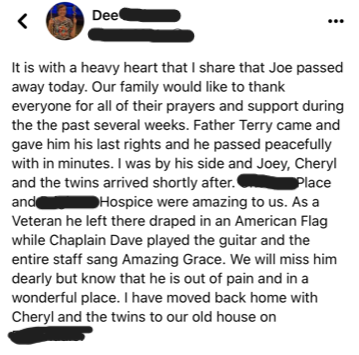You Are Not Hiding Anything
- jenni253067
- Jun 21, 2022
- 4 min read
Honoring life and death in long term care
Humble and kind, intellectual and wise, Charlie was rarely seen without a book in his hand or leaning in intently to contribute to a discussion. With 97 years of life experience, he was quick to listen, slow to speak and slow to anger. He impressed me with his ability to weave magic into the life of his beloved granddaughter. And Charlie taught me a lesson I will never forget.

Nearly twenty-five years ago, I had the honor of working with Charlie at a small-town nursing home deep in the Gunnison valley of the western slope in Colorado. The county-run community was steeped in the medical model. From its institutional design of decades past to the practices that focused on the convenience and efficiency of staff this place became the fertile soil in which the first seeds of culture change would be sewn.
Under the wise leadership of a fresh and innovative administrator, a warming of the soil began, and the staff and elders dipped their toes in the waters of the culture change movement. Soon we were having meaningful conversations around the three plagues of loneliness, helplessness and boredom that make up the bulk of suffering in long term care, for residents and for staff.
It was at one of these early discussions at a Resident Council meeting that Charlie offered the words that stopped me in my tracks. "You know we see, right? You aren't hiding anything."
With his thoughtful and measured voice, he offered his sage observation of how we handled death in his community. Charlie recounted the ways we, the staff, tried to hide death from residents and we were definitely guilty. We closed the blinds when the funeral hearse pulled up to collect another of his friends. We ushered people into their rooms, closed doors, snuck through side entrances, distracted with a game of bingo...anything but acknowledge and honor the relationships the residents had formed with each other. "I don't want that to
be me", he said "I want to know that I mattered to you. You matter to me."

While attempting to "protect" elders from the reality of life and death, our well-intentioned practices undermined the meaningful relationships we spent the rest of the time cultivating and cherishing. In his 2017 article "Let's Stop Throwing Out the Dead with the Trash", funeral home director, Caleb Wilde gives an account of just how pervasive and damaging this practice is.
"Most funeral directors will tell you that when you go to a hospital to pick up a deceased person, you’ll most likely park your removal van or hearse in the same area where the hospital throws out the trash. Finding ways to embrace our dead, instead of hiding them, is all a part of death positivity. We don’t need to fe
ar our dead. We don’t need to hide them. We don’t need to be ashamed of them. Instead, we need to welcome the dead into our lives and allow them spaces among the living." In the same breath, Mr. Wilde offers an antidote, "A couple months ago I shared a beautiful experience I had at a nursing home. As I shared in that post, when we funeral directors come to remove a deceased person from a nursing home, most nursing homes have a “hide the body” mentality or a “back door policy” that ushers the deceased out the back door so no one sees it.

As I’ve come to find out, some nursing homes have a “front door policy” where the death is acknowledged, and the dead honored by the nursing home and its staff. My recent experience with this “front door policy” included the nursing staff creating a walk of honor. The staff lined the hallway walls as I left the nursing home with the deceased, acknowledging the life lived and lost."
With Charlie's guidance, we began to do things differently. Deaths were now acknowledged and announced. Photo frames were displayed in the lobby and at the residents' usual spot in the dining room along with a single rose. Staff and residents became used to taking a moment to honor the deceased as they left the community for their final time with a song or ringing of a bell. Residents requested to use their activity space to hold memorial services and even formal open casket viewings and they invited their families and the greater community to bear witness to lives lived and lost. Because of Charlie's sage and brave observation and invitation to discussion, new life was breathed into the community and we were all better for it.
Fast forward a couple decades, another town, another care setting. Here is another way we found to honor and remember with a front door policy of own. Dee says it best...


#dementia #alzheimers #longtermcare #death #hospice #mydementiatribe #caregiver #agingservices #frontdoorpolicy #endoflife #activitiesstrong #edenalt #knowbetterdobetter
#oldpeoplearecool #alzheimers #dementia #alzheimersawareness #caregiver #seniorcare #dementiacare #caregiving #dementiaawareness #alzheimersdisease #elderlycare #eldercare #seniorliving #homecare #alzheimersassociation #endalz #assistedliving #alzheimer #healthcare #caregivers #health #caregiversupport #elderly #care #memorycare #aging #love #alzheimerscare #family #seniors #alzheimerscaregiver

Comments